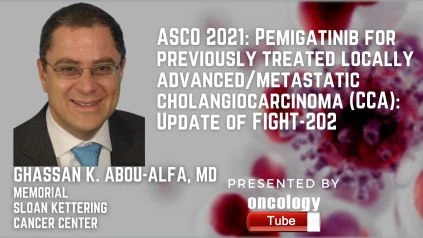Ghassan K. Abou-Alfa, MD, medical oncologist at Memorial Sloan Kettering Cancer Center speaks about the ASCO 2021 Abstract – Pemigatinib for previously treated locally advanced/metastatic cholangiocarcinoma (CCA): Update of FIGHT-202.
Link to Abstract:
https://meetinglibrary.asco.org/record/197197/abstract
Background information:
In the FIGHT-202 trial, pemigatinib (PEMI), a powerful, selective oral FGFR1-3 inhibitor, was demonstrated to be effective and safe in patients with CCA and FGFR2 rearrangements/fusions (NCT02924376; objective response rate [ORR], 35.5 percent ; duration of response [DOR], 7.2 months [mo]). In the main publication (Abou-Alfa. Lancet Oncol 2020; cutoff: Mar 22, 2019), overall survival (OS: 21.1 mo) was not mature; herein, we describe matured effectiveness and safety data from FIGHT-202 (cutoff: Apr 7, 2020).
Methodologies:
FGFR2 rearrangements/fusions (cohort A), other FGF/FGFR alterations (B), or no FGF/FGFR alterations (C) were found in patients (18 years) with known FGF/FGFR changes and progression after 1 previous treatment (C). Pts were given 13.5 mg PEMI QD for 21 days (two weeks on, one week off) until progression or toxicity. ORR (cohort A); secondary endpoints: ORR (cohorts B, C; combined cohorts A and B); DOR, disease control rate (DCR), progression-free survival (PFS), OS, and safety. Responders (pts with complete response [CR] or partial response [PR]) vs non-responders (pts with progressing disease [PD] or stable illness) were compared in a post-hoc analysis in cohort A. (SD]).
The following are the outcomes:
At the cutoff, 147 patients were included (cohort A, n=108; B, n=20; C, n=17; FGF/FGFR status unknown, n=2), with a median follow-up of 30.4 months (range 4.9–38.7) and a median treatment duration of 5.9 months (0.2–36.5). At the cutoff, 9.3 percent of pts in cohort A were still on medication; in cohorts B and C, all pts had stopped. Pts were phased out mostly due to Parkinson’s disease (67.6 percent, 75 percent, and 64.7 percent in cohorts A, B, and C respectively). In cohort A, the independent, centrally verified ORR was 37.0 percent, and the median OS was 17.5 months (95 percent confidence interval: 14.4-22.9). (Table 1). Responders (n=40) had a mOS of 30.1 (95 percent CI, 21.5-NE) mo vs. non-responders (n=68) of 13.7 (9.6-16.1) mo. Hyperphosphatemia (58.5 percent ; grade 3, 0 percent ), alopecia (49.7% ; 0 percent ), diarrhea (46.9% ; 3.4 percent ), fatigue (43.5 percent ; 5.4 percent ), nausea (41.5 percent ; 2 percent ), and dysgeusia (40.8 percent ; 0 percent ) were the most common all-cause treatment-emergent adverse events (TEAEs); 10.2 percent, 13.6 percent, and 42.2 percent of patients
Final Thoughts:
These findings support the original evidence by demonstrating persistent, persistent responses and tolerability in patients who received PEMI for CCA with FGFR2 rearrangements/fusions. The developed OS is noticeably longer than previous data; the OS for respondents was more than twice as long as the OS for non-responders. NCT02924376 is the number for the clinical trial.

